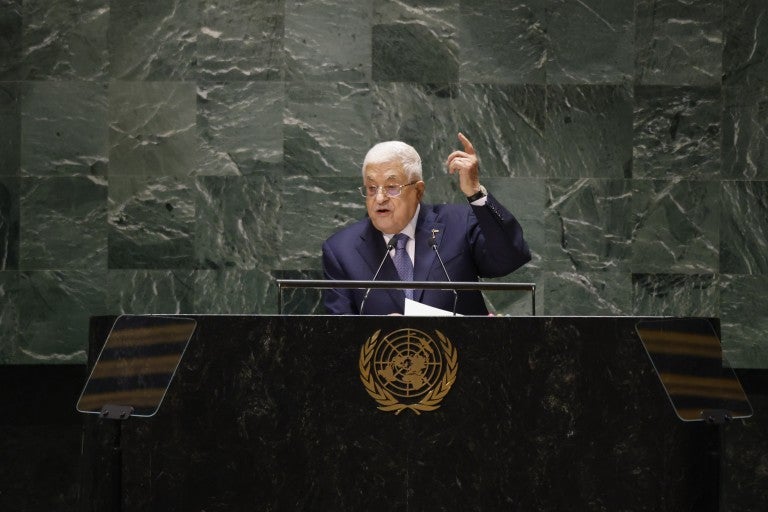December 4, 2017
The range of bizarre UN member state machinations about Israel is apparently unlimited.
On Thursday, the UN General Assembly demanded, yet again, that Israel withdraw completely from the Golan Heights and resume peace negotiations with Syria. The resolution, adopted by a vote of 105-6, with 58 abstentions, did not mention the civil war in Syria, now in its seventh year.
This latest UN action is nothing new. The Syrian Golan resolution has been on the General Assembly docket annually since the early 1980s, conveniently included in “The Situation in the Middle East” package of measures, mostly supporting a variety of Palestinian causes, which single out Israel for harsh condemnation. They are habitually introduced, then adopted by an overwhelming majority and added to the UN files without advancing any prospects for Arab-Israeli peace.
Only the United States, Israel, Canada, the United Kingdom, Micronesia and Marshall Islands voted no on the Golan resolution. For the UK, which had abstained on the same measure in 2016, this was progress.
It was a very rare moment of consensus at the UN on dealing with Syria. Russia, which has singlehandedly blocked any meaningful resolution on Syria since 2011, and has vetoed, to date, 10 proposed Security Council measures, joined with those voting yes.
The Golan resolution expresses “deep concern that Israel has not withdrawn from the Syrian Golan,” and “grave concern over the halt in the peace process on the Syria track.” It further “demands once more that Israel withdraw from all the occupied Syrian Golan to the line of 4 June 1967.”
Those nations that supported the resolution thus agreed with Syrian Foreign Minister Walid Muallem, who declared in his September address before the UN General Assembly that “It is delusional to believe, even for a moment, that the crisis in Syria will make us forget our inalienable right to recover the occupied Syrian Golan fully to the lines of June 4, 1967.”
In UN deliberations, both historical context and present realities are ignored.
Israel came into possession of the Golan in June 1967 in the course of a defensive war against Egypt, Syria and Jordan, a coalition that aimed to annihilate the Jewish state only 19 years after its birth. Prior to the war, Syria regularly used the towering Golan Heights to shell Israeli communities below.
While Egypt, and then Jordan, would achieve peace treaties in 1979 and 1994 with Israel, Syria’s leader, Hafez Assad, resisted substantive negotiations with Israel despite US prodding.
Serious Israel-Syria talks did take place, notably at the Wye River Conference Center in the 1990s, following the 1991 Madrid peace conference. And as late as 2010, there were secret talks between representatives of President Bashar Assad, who had succeeded his father after his death in 2000, and Prime Minister Benjamin Netanyahu.
But rather than genuinely pursue peace, Assad continued to develop a large chemical weapons arsenal and attempted to develop a nuclear weapon. Israel, in an act of self-defense, destroyed Syria’s nuclear reactor in 2007.
The truly pressing issue today regarding Syria is not the status of the Golan, or even peace with Israel. It is the tragic reality of a country decimated by its own leader, who, in March 2011, launched a bloody war against his people.
Today, with more than 500,000 dead and one-third of the surviving population displaced inside the country or living as refugees outside Syria, the fighting continues. Yet, there is an emerging international consensus that acknowledges Assad will stay in power, and the Russians and Iranians who helped his regime survive amid the rubble of his country will remain in Syria.
Currently, Iran’s direct intervention in the war, the continuing expansion of its forces’ presence, and its designs to establish a base for its troops or for Hezbollah – Iran’s terrorist proxy – near the current border on the Golan, pose an ongoing threat to Israel. That should be of concern to UN member states, but is ignored.
Since the war in Syria began, Israel has avoided involvement while at the same time monitoring conditions closely, and, when deemed necessary for its own security, carrying out military strikes, mostly targeting Hezbollah. Most important, Israel has welcomed and delivered medical care for Syrians, some badly wounded by Assad’s forces, who crossed the border.
Whether an Israeli-Syrian peace process can restart one day depends largely on conditions in Syria and the future direction of Assad or his successor. As with other Arab-Israel peace efforts, success will come from direct, bilateral talks, not in the halls of the UN.
The Golan resolution, then, is nothing more than another pitiful and meaningless UN product.
The writer is the American Jewish Committee’s director of media relations.
http://www.jpost.com/Opinion/On-My-Mind-UN-prioritizes-the-Golan-517002



